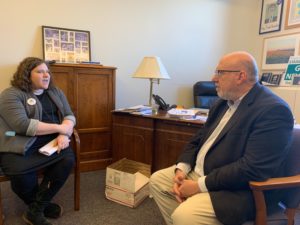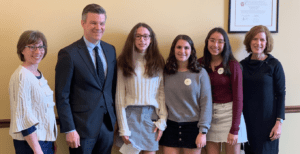“I heard over and over again, how grateful they are for this partnership that it helps them to do their job better to be able to see this solidarity,” said Beth Gendler, the executive director of National Council of Jewish Women Minnesota. The event which was organized by Muslim & Jewish Women of Minnesota – a cooperative group of Reviving the Islamic Sisterhood for Empowerment (RISE) and NCJW Minnesota. “That’s the whole mission of the collaboration is to disrupt that false narrative.”
This year’s event, which was Tuesday, Feb. 18, had more than double the participants of last year, which meant many more opportunities for meetings and face time with the legislators.
The group of started the day crammed into the Minnesota Capitol Press Conference Room were told that the Capitol building was their house. After a brief training, the women were sent across throughout the tunnels and staircases of the Capitol and the Senate and House office buildings to lobby their legislators.
There were three legislative policy areas that MJWMN came prepared to lobby for: Eliminating the statute of limitations for reporting sexual assault, bringing menstrual equity to Minnesota schools, and enhancing hate crimes laws in Minnesota. The authors for the latter two bills were among the seven that spoke the group before they began to meet with their representatives. Among the group were three eighth-graders from Heilicher Minneapolis Jewish Day School who were working on their capstone project, and 20 Muslim students from Como Park High School, which has been dealing with a significant amount of anti-Islamic verbal and physical abuse.
“I think for a couple of the students that I interacted with, this space always felt like it wasn’t approachable or a place for them,” said Nausheena Hussain, the executive director of RISE. One of the legislators that spoke to the students was Rep. Hodan Hassan, a Muslim woman who represents part of southeast Minneapolis, and Hussain said her presence made a big impact on the students.
“Here is a representative, Hodan Hassan who talked about ‘this is your house,’ and she looks like them,” Hussain said. “How can I be what I cannot see? So if I see somebody that looks like me, which they did, then there is a feeling of ‘You know what? This is for me, too. I get to come in here and talk about the issues that are concerning to me and my family and my friends and my school, and somebody has to listen.”

Erica Solomon meets with Rep. Frank Hornstein.
Rep. Frank Hornstein, who is the author of the legislation to enhance hate crime laws in the state, said that days like this are ones that he truly enjoys.
So lobby days like this are meaningful when people I represent come,” he said. “So often we have paid lobbyists, oftentimes representing, quite frankly moneyed special interests. And so to actually have citizens that we represent at the grassroots level coming to the capital, particularly in larger numbers, that makes a big difference.”
Erica Solomon is one of Hornstein’s constituents in the Lowry Hill neighborhood of Minneapolis. At her meeting, she used the time to lobby Hornstein on all three policies that the group – including his own.
“My dad’s executive director at Mount Zion, and I just remember the day that the Tree of Life shooting happened and it was one of the hardest days in my recent memory because I just thought about how people that work in the Jewish community and Jewish organizations, whether it’s in St. Paul, Minneapolis, or [Pittsburgh], are living it,” she said. “They’re potentially exposed to these people that want to come and make our neighbors feel unwelcome. Anything we can do to stop that is very important to me.”
Hornstein said that data is showing dramatic increases in hate crimes in all categories – not just against Jews and Muslims.
“One of the things that have been so rewarding about working on this bill is that people are coming together that normally wouldn’t,” he said. “I think that’s a good sign that there’s solidarity among people who care deeply about these issues. And there’s a lot of allies who want to work on this.”
The three HMJDS teens – Zoe Ziessman, Rebecca Gendler and Nina Miller – all met with several

Esther Goldberg-Davis, Rep. Ryan Winkler, Rebecca Gendler, Zoe Ziessman, Nina Miller, and Deb Savitt.
legislators. Even though they weren’t lobbying with the teens from Como Park, Rebecca said it was important that there was a strong showing.
“With the hate crimes bill, we really are in this together,” she said. “I think it’s really meaningful that we’re here with them, even if we’re not communicating as much, but we’re kind of on separate sides of what’s going on. It’s been awesome to have that community here.”
The three of them were sent off with a more experienced adult to speak with a legislator before the training. The first visit helped them get more comfortable with the process.
“I was really worried at first, but it was a good intro because we went with someone who knew what she was doing,” Zoe said. “She started out saying what the [issues] were and we got to give our thoughts on them. It was a good way to not do everything, but to see what we could do and get more involved.”
By the time they got to meet with, DFL House Majority Leader Ryan Winkler, they were showing strong knowledge and comfort talking about the issues, and all three told Winkler about their capstone projects, and how each connects to the policy priorities of MJWMN. Winkler said that showing up to speak to legislators makes a difference.
“In Minnesota, we are lucky that a lot of people show up,” he said. “Constituent voices are a big deal here. Showing up and telling us things that you care about, and letting me know that this is on your agenda, that you’re constituents of mine, that this is important, that will actually shape what I work on.”

